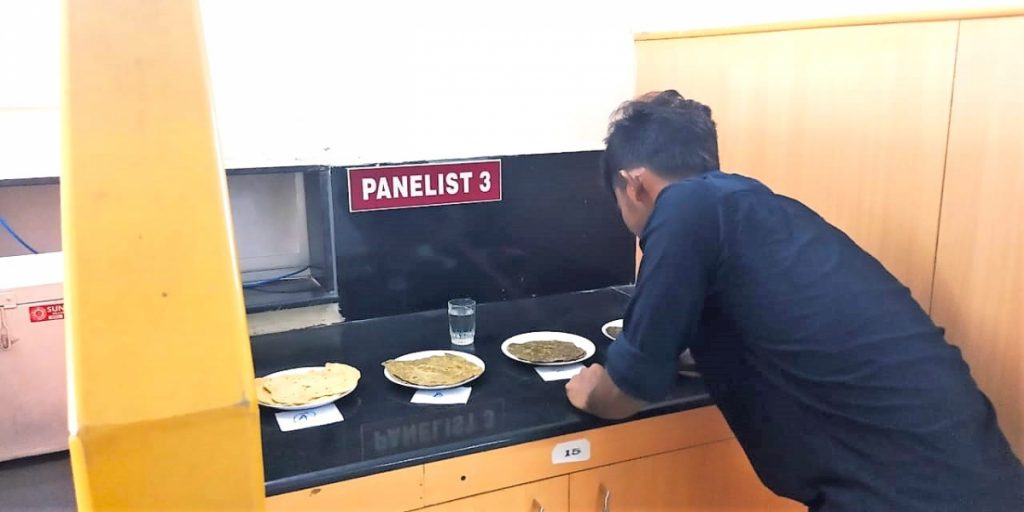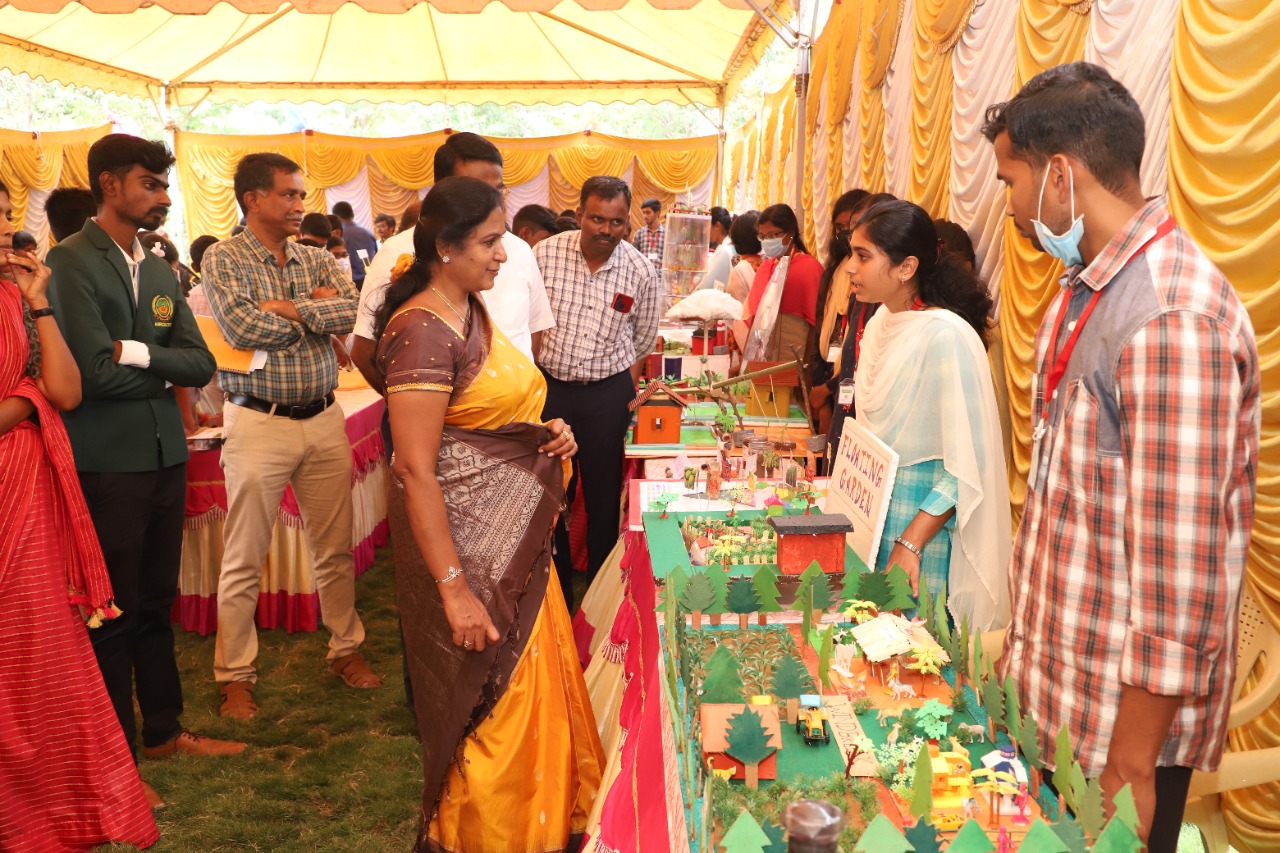The Tamil Nadu Agricultural University (TNAU) had its genesis from establishment of an Agricultural School at Saidapet, Madras, Tamil Nadu, as early as 1868 and it was later relocated at Coimbatore.
Get in touch
- info@tnau.ac.in
- 0422 6611200
- Monday to Friday: 9am to 5pm

M.Sc. (Community Science) in Food and Nutrition
Prelude
The Post Graduate degree programmes in Food and Nutrition will provide for purpose-driven education, research and outreach in terms of developing competency among the graduates to face the challenges of the competitive food processing sector. The present food market demand drivers include the need to supply both globally and locally adequate quantities of safe, healthy and diversified food from production to consumption, which calls for skilled, knowledgeable and practice-ready food scientists. The fast paced growth of the food processing sector throws immense challenges in terms of nutrition, health and wellbeing of the increasing population groups who demand for novel foods in terms of quality, shelf life and functionality. Towards this end, competency in food and nutrition at the post graduate level is an important contributor to building the capacity of individuals to think and act effectively when developing and implementing strategies for combating malnutrition and other degenerative diseases.
Why this programme?
- As part of the State Agricultural University, which works towards achieving food security for the state and nation at large, the post graduate programme in food and nutrition holds utmost relevance in developing appropriate post harvest techniques in food processing and value addition, reducing food loss and wastage, food safety assurance and contribute towards enhancing and sustaining food security measures.
- Further, nutrition concentration adds knowledge and value to food matrices which optimise towards maximising nutrient bioavailability, contribute health promoting functional food ingredients, healthy food choices, nutrition education etc., which would address the vulnerabilities in achieving nutrition security.
- Our graduates are also trained to understand nutritional problems in diverse contexts which impede comprehensive nutrition and health security, by understanding the complexities of the dual burden of malnutrition namely under and over nutrition and the associated health complications, which can be ably supported by personalised nutrition and counselling.
- The present concerns of communicable diseases like Covid-19, placing stress on the nutrition and health of all age groups and the vulnerable sections of the population in particular, the community can most benefit from the expertise in the domain of food and nutrition programme, where the importance of optimum nutrition has become household like never before.
- The curricula has been designed to develop the knowhow and skills among the graduates to operate sophisticated analytical equipments, work in renowned laboratories within the country and globally, carry out new food product development strategies, conducts food quality and safety analysis, shelf life testing, improve commercialisation prospects etc.,
- The programme encourages gaining essential transferable skills including independent thinking; planning and problem solving; observation and analysis; and towards dissemination and communication of information in community development programmes.
Study Programme
The Masters in Food and Nutrition has been designed based on the ICAR – BSMA guidelines. The course in Food and Nutrition provides comprehensive theoretical and practical skills required to carry out independent research in the discipline of food science and nutritional studies. The course aims towards
- Providing theoretical and practical exposure in recent advances in the food and nutrition discipline with regard to food composition, food quality and safety, nutrient interactions, metabolic interactions, food toxicology, advanced understanding of energy expenditure, energy balance, sports nutrition, public health nutrition etc.,
More details on the list of courses and research work experience to be gained is listed
PG Courses Offered
To replace table content
SI. No. | Course No. | Course Title | Credit Hours |
1. | FSN 501* | Macro and Micro Nutrients in Human Nutrition | 3+0 |
2. | FSN 502* | Public Health and Nutrition | 2+1 |
3. | FSN 503* | Techniques in Food Analysis | 1+2 |
4. | FSN 504* | Diet Therapy | 2+1 |
5. | FSN 505 | Nutrition and Physical Fitness | 2+1 |
6. | FSN 506 | Developments in Nutrition and Immunity | 2+0 |
7. | FSN 507 | Clinical Nutrition | 2+1 |
8. | FSN 508 | Nutrition Counselling | 0+2 |
9. | FSN 509 | Food Safety and Standards | 2+1 |
10. | FSN 510 | Nutritional Challenges in Life Cycle | 2+0 |
11. | FSN 511 | Food Science | 2+1 |
12. | FSN 512 | Food Processing Technology | 2+1 |
13. | FSN 513 | Human Physiology | 3+0 |
14. | FSN 514 | Institutional Food Service Management | 1+1 |
15. | FSN 515 | Grain Processing Technology | 2+1 |
16. | AGM 505 | Food Microbiology | 2+1 |
17. | BIC 502 | Nutritional Biochemistry | 2+1 |
18. | FSN 591 | Master’s Seminar | 0+1 |
19. | FSN599 | Master’s Thesis Research | 0+30 |
Colleges offering M.Sc. (Community Science) in Food and Nutrition
The master programme in M.Sc. (Community Science) in Food and Nutrition is offered by the Department of Food Science and Nutrition, Community Science College and Research Institute, Tamil Nadu Agricultural University, Madurai – 625 104, Tamil Nadu
Application and Admission
For those students who are interested in taking part in the M.Sc. (Community Science) in Food and Nutrition degree programme, details on the specific Admission requirements and the application procedures are available at University website.
Future Career
In recent times, Food Science and Nutrition is an emerging developing field, where food insecurities are mounting both within the country and globally leading to increasing prevalence of protein energy malnutrition, micronutrient deficiencies and non communicable diseases. As a result, the demand for professionals in this field is ever increasing. Hence, specialized candidates in this field can find employment opportunities in diverse sectors which cater to food and nutrition.
Want to know about the job opportunities after completing the Masters programme in Food and Nutrition Course. See where our alumni are placed
To replace table content
Master’s in Food and Nutrition course
Master Courses
After admission, the students undergo a set of courses (Major, Minor, supporting and Non-Credit Compulsory Courses) that help them to understand the advances in the field of Food Science and Nutrition. The study programmes based on Choice Based Credit System (CBCS) with a total credit load of 70 credits, of which 30 credits are exclusively earmarked for Thesis Research.
Master’s thesis research
After completing the courses in the first year, the students start their thesis research. Each student is assigned to an experienced faculty, approved by the Dean of School of Post-Graduate Studies, who would guide the student on his/ her choice of research topic
Research internship
The students are encouraged to participate and present their in scientific events like symposia and conferences. Als, students are motivated for internship training at other institutes either in India or abroad.
Online courses
As per the ICAR guidelines maximum of 20% credits per semester may be allotted for online courses. The Master’s students may registered Online courses / Massive Online Open Courses (MOOC) related to Food and Nutrition offered by MHRD, GOI through SWAYAM – NPTEL project / ICAR institutes such as NIPHM, MANAGE, NAARM and other reputable National and International institutions.
Student Experiences

The course in M.Sc. (Community Science) in Food and Nutrition provides all the learning skills required for research in food processing and preservation with maximum retention nutrients in food and nutrient bioavailability. This degree covers important subjects including Advances in Macro and Micronutrients, Nutritional Status Assessment, Food Preservation Technology, Food Microbiology, Food Science, Nutrition and Diet in Diseases, Nutrition for Physical Fitness, Nutrition in Weight Management, Diet management for various metabolic disorders and the like. The course curriculum offers wide scope for industry application and opportunities for developing relevant skills for career in Food and Nutrition including medicine, sports and fitness, science and research, food processing industries.

The course syllabus holds an in-depth coverage of food science, food processing, technology, nutrition and dietetics. The contents covered in each subject has been designed in order to enable scholars avail career opportunities in public and private sectors. In addition, food microbiology, food biochemistry and mathematics courses have been added as supporting courses to facilitate competency for conducting intensive research in food product development and analysis. The course delivery presented clarity and recent technological advances which were taught by competent faculty with the aid of AV aids, demonstrations and hands on experiential learning opportunities so that students have maximum understanding and retention of knowledge. The hands-on practical classes were most helpful for gaining the necessary skills to become a food entrepreneur. Doubts and questions were clearly explained by the course teachers. Students were encouraged to take seminars to improve their presentation skills, become self confident and also to gain in-depth knowledge in the subject. The college environment was pleasant and the Professors were sociable and most supportive in students’ academic activities.

